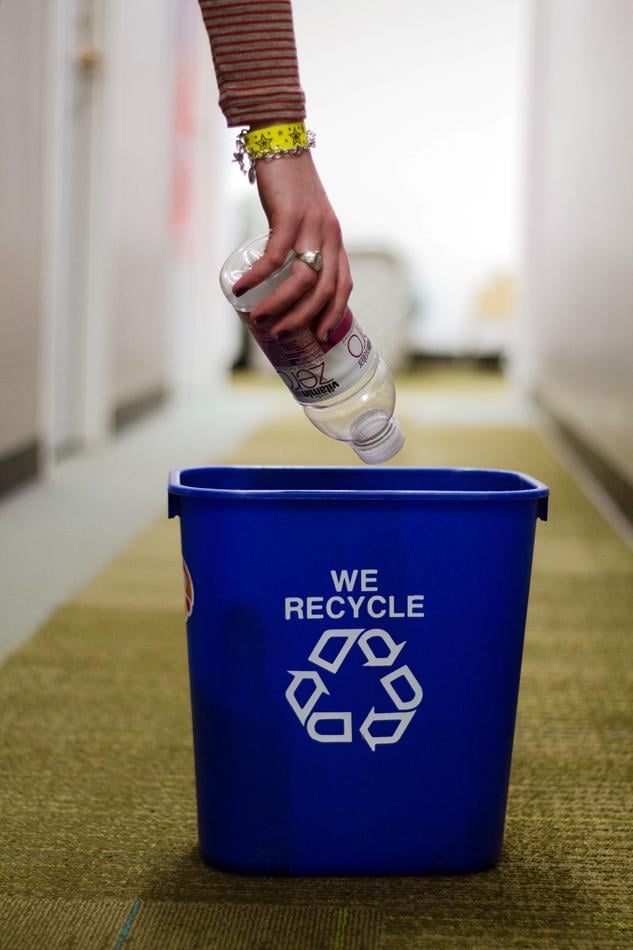City looks to raise recycling rate of businesses, apartments
Lan Nguyen/The Daily Northwestern
A student recycles a plastic bottle in a residence hall. Many apartment buildings in Evanston lack recycling services such as those found on campus.
April 10, 2014
As Evanston renegotiates its trash and recycling collection contracts, city officials plan to improve the recycling rate of businesses and apartment buildings before the contracts are due for renewal in late 2015.
In 2013, commercial buildings and multi-family buildings recycled about 8 percent of their waste, Public Works director Suzette Robinson said during last week’s City Council meeting. Although the number, known as the diversion rate, is almost double the recycling done by businesses and apartments in 2009, it remains low compared to the 40 percent of recycling done by single-family homes.
Robinson said during the meeting that the renewal of the contracts provides a good opportunity for the city to improve the diversion rates of both apartment buildings and single-family homes.
“This is the time for us, … whether it’s by ordinance or by contract, to encourage more recycling,” Robinson told The Daily.
City manager Wally Bobkiewicz said during last week’s meeting that the issue will generate “lots of discussions, lots of community meetings over the next 18 months or so.”
“I’m waving my red flags,” he said. “These are significant issues that we’ll be grappling with.”
The increase in the diversion rate of commercial and apartment buildings in the past few years, Robinson said, is largely due to the city’s Municipal Solid Waste Franchise program, which was adopted through a city ordinance in 2008. The program, which was intended to reduce waste removal costs for individual businesses and apartment buildings, provides a single collection agency contracted to collect waste for all commercial and multi-family residential buildings in Evanston.
Evanston residents who live in single-family homes use the city’s trash collection service, which also provides weekly recycling pickup. Robinson said this service makes recycling for single-family homes easier than for apartment residents or businesses.
“When it’s your home and you can directly manage it, and you’re going out to your container anyway, it’s easy to kind of separate (recyclables),” she said.
Apartment owners participating in the Municipal Solid Waste Franchise program are required to provide a city-issued 95-gallon recycling bin in their buildings. But owners must pay more for their buildings to receive increased recycling services, Robinson said.
The city has not yet come up with a plan for future contracts. To raise the recycling rate of businesses and apartments, the city plans to conduct surveys and research before drawing up a new request in the fall for companies to submit contract proposals to trash and recycling collection services. Both the Municipal Solid Waste Franchise program and Evanston’s residential trash and recycling contracts are up for renewal in late 2015.
The city is currently testing pilot programs in apartment buildings by providing recycling bags and visiting buildings to evaluate space concerns. Robinson also wants to encourage more recycling from businesses.
“We’re looking at the possibilities and opportunities for a commercial food scrap program, which would significantly raise the diversion rate for the restaurant population,” Robinson said.
Bobkiewicz said during the council meeting last week that a new contract “could very well be a major change as to how we do business with our collection of refuse and recycling.”
“The result will be … very much confusion, very much anger, among perhaps property owners who will say they do not have any room for this,” he said. “We will be likely bringing forward proposals that will be very provocative, very different … that will have major impacts on the many many thousands of residents throughout Evanston who live in multi-family housing facilities.”
When the Municipal Solid Waste Franchise program began, about 35 percent of buildings that purchased waste collection services also requested recycling. That number has since increased to more than 50 percent. Robinson said she hopes a new contract in the future will incentivize all businesses and apartment buildings to sign up for increased recycling services.
“For me the goal would be 100 percent participation,” she said. “I think it’s a doable goal … that will automatically increase our diversion rate because everybody will be participating.”
Email: [email protected]
Twitter: @jeannekuang


